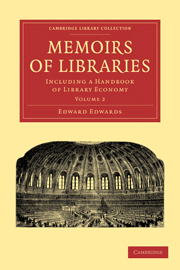Book contents
- Frontmatter
- Contents
- Chapter XV The Older Libraries of English Towns, and Their Management By Munic
- Chapter XVI The Parochial and Quasi-Parochial Libraries of England
- Chapter XVII The History of The “Public Libraries Acts” of 1850 and 1855
- Chapter XVIII The Working of The Public Libraries Acts of 1850 and 1855
- Appendix to Volume I
- Part The First. History of Libraries (Continued.)
- Book IV. The Libraries of The United States of America
- Book V. The Modern Libraries of Continental Europe
Chapter XL - The Libraries of Spain and Portugal
Published online by Cambridge University Press: 29 August 2010
- Frontmatter
- Contents
- Chapter XV The Older Libraries of English Towns, and Their Management By Munic
- Chapter XVI The Parochial and Quasi-Parochial Libraries of England
- Chapter XVII The History of The “Public Libraries Acts” of 1850 and 1855
- Chapter XVIII The Working of The Public Libraries Acts of 1850 and 1855
- Appendix to Volume I
- Part The First. History of Libraries (Continued.)
- Book IV. The Libraries of The United States of America
- Book V. The Modern Libraries of Continental Europe
Summary
Books in Spain have always been both scarce and dear, for where There are few purchases, prices must be high to remunerate The publisher or importer. The Public Libraries of Spain are few and imperfect. Those recently formed in provincial towns consist of brands rescued from The suppressed convents, and chiefly relate to monastic and legendary lore. Every collection or Library in Spain is subject to dilapidations of various kinds. There is seldom any catalogue, and should one exist, it is soon mislaid. None, Then, can check Directors or Empleados who pick out The plums, or exchange imperfect copies for The good ones; and thus men, beggars by birth, end with fine Galleries and Libraries.
FORD Handbook of Spain,third edit., i, 84).The principal Library of Spain is The Biblioteca Realat Madrid, which dates from The reign of PhilipV., and is now lodged in an edifice, once The mansion of Royai Library The Alcanices family, on The Plaza del Oriente. It is open to all comers, as far at least as The printed books are concerned. The reading-tables are placed in three spacious apartments, corresponding to as many sides of The edifice, which is built round a court, with a fine staircase in The centre; in The middle of These rooms are rows of tables provided with writing materials and chairs; and against The walls are The book-shelves, numbered and tastefully ornamented. The catalogues are kept in a small room apart, where There are two or three persons in attendance, to answer The inquiries of The stranger, and to furnish him with The number and shelf where any particular work may be found. The service of The establishment is excellent. The Royal Library contains about 200,000 printed volumes, and from 2000 to 3000 manuscripts, amongst which are many valuable Greek, Latin, and Arabic codices, and inedited works, chiefly Spanish. A recent traveller, speaking of The Biblioteca Real,says, “It is one of many institutions which awaken The admiration of The stranger in Spain, as being at variance with The pervading decay.” Mr. Ford, however, tells us that “good modernbooks are here, as in most other Spanish Libraries, The thing needful.“
- Type
- Chapter
- Information
- Memoirs of LibrariesIncluding a Handbook of Library Economy, pp. 548 - 555Publisher: Cambridge University PressPrint publication year: 2010First published in: 1859



